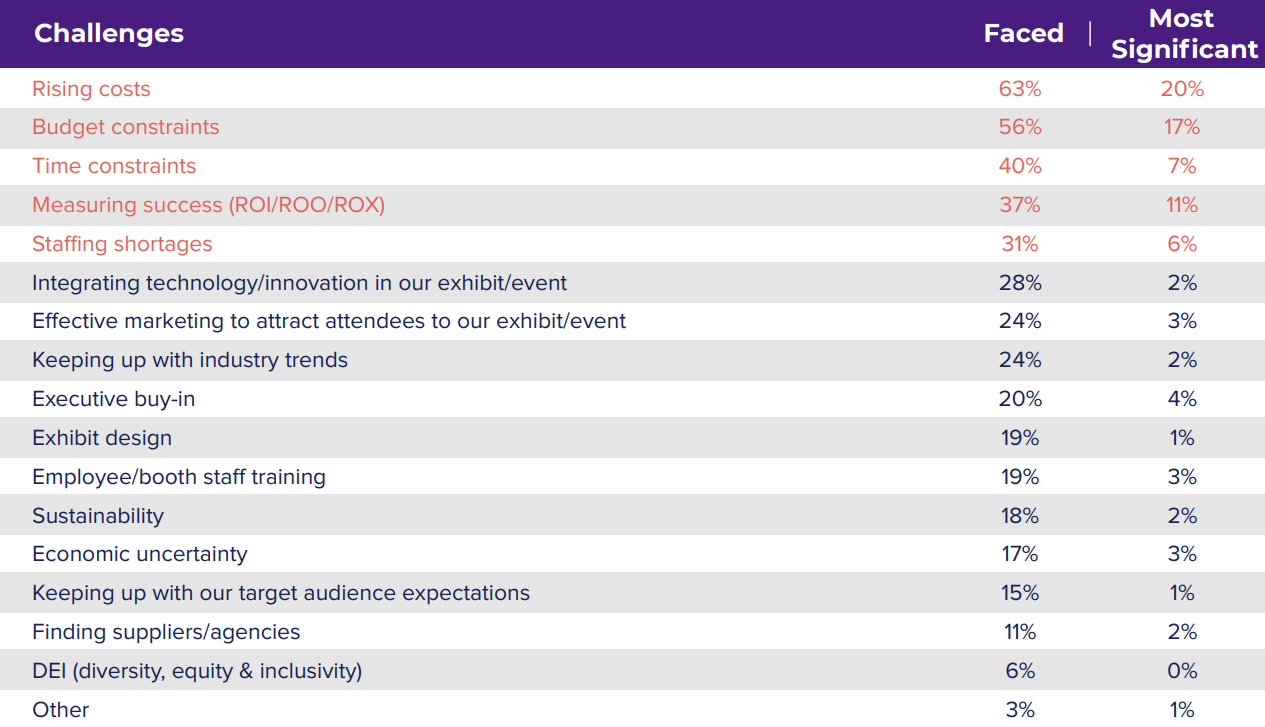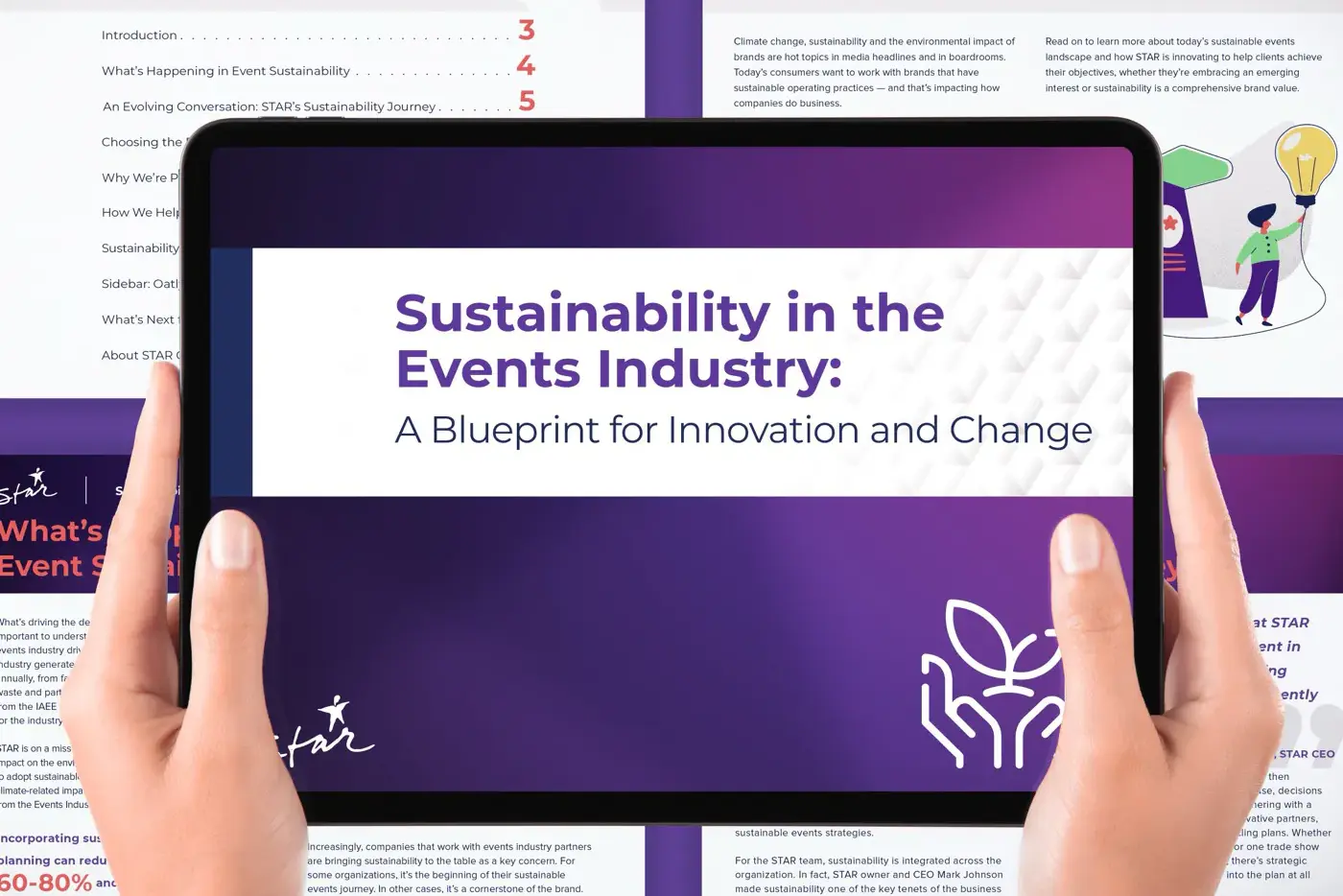Table of Contents
Introduction
Marketing events are critical components of modern marketing strategies, providing unique opportunities for brands to engage directly with their target audiences. From trade shows and conferences to product launches and experiential marketing events, these occasions allow companies to showcase their offerings, build relationships, and enhance brand visibility.
However, managing such events is a complex task fraught with numerous challenges. Based on a survey of 369 exhibit and event professionals that attended ExhibitorLIVE 2024,rising costs, budget constraints, time constraints, measurement difficulties, and staffing shortages were ranked as the top five most faced and most significant challenges in the survey. Other notable challenges include integrating technology in exhibits, effective marketing to attract attendees, keeping up with industry trends, and sustainability.
These challenges often intersect (the survey also revealed that attendees face about 5 of these challenges on average)requiring marketing teams to develop comprehensive strategies that balance creativity, technology, data-driven decision-making, and strategic planning. This paper explores the top challenges faced by marketing event managers today, and offers insights into industry trends and practical advice for overcoming these obstacles.
Challenges faced in day-to-day job
Rising costs
Balancing quality experiences with rising expenses A primary challenge for marketing event managers is the rising cost of organizing events, driven by inflation and increased demand. Prices have been steadily increasing for venues, services, and supplies, particularly in major cities and popular event destinations. Event managers must contend with escalating costs for venue rentals, catering, technology, exhibit transportation, and essential services such as audiovisual equipment, security, and logistics.
These factors significantly strain event budgets and put pressure on organizers to deliver high-quality experiences within tightening financial constraints. As a result, event marketers face the challenging task of creating impactful events that meet these elevated standards while simultaneously managing and mitigating the effects of these escalating costs. This balancing act has become increasingly difficult, forcing event professionals to find innovative solutions to deliver memorable experiences without exceeding budget limitations.
Strategies for managing and mitigating rising costs:
- Prioritize spending on elements that deliver the highest ROI
- Negotiate with vendors for better rates or bundled services
- Opt for off-peak dates to take advantage of lower prices
- Explore alternative venues that offer more cost-effective solutions
- Leverage technology to streamline operations and reduce labor costs
- Implement cost-sharing strategies with partners or sponsors Utilize data analytics and best practices from experienced event partners to identify areas where costs can be optimized without sacrificing quality
Budget constraints
Wrestling with ROI demands and the cost-quality balance Closely related to rising costs are budget constraints, which pose a significant challenge for event marketing managers. The trend towards data-driven marketing has led to increased demands for demonstrable ROI from events, making it challenging for marketers to secure and maintain adequate budgets. Even when events have substantial budgets, the need to balance cost effectiveness with quality and innovation remains a pressing concern.
Managing an event’s financial resources requires meticulous planning and constant vigilance to ensure that expenditures align with allocated budgets. This often involves making difficult decisions about where to allocate funds and where to cut costs. Event managers must prioritize elements that will have the most significant impact on attendee experience and event objectives while finding creative ways to reduce expenses in less critical areas.
Techniques for effective budget management
- Have a clear strategy to ensure spending is focused on objectives
- Prioritize high-impact elements such as bold, attention-grabbing design Create tiered event plans that allow for scalability based on available budget
- Explore exhibit rentals for budget flexibility Incorporate digital elements to reduce the cost of updating creative and printing
- Leverage technology to reduce costs in areas such as registration, networking, and follow-up Work with a full-service partner to streamline event support costs
- Explore sponsorship opportunities to offset costs Implement a zero-based budgeting approach to justify each expense
Time constraints
Juggling complex tasks in a fast-paced industry Time constraints are an ever-present challenge in event management. The planning and execution timelines for events are often short, requiring managers to juggle multiple tasks and deadlines simultaneously. From securing venues and coordinating logistics to marketing the event and managing registrations, the sheer volume of work can be overwhelming.
The fast-paced nature of the marketing world, coupled with the increasing complexity of event planning, exacerbates time pressures for event marketers. For example, the trend towards more personalized, tech-integrated events requires longer lead times and more detailed planning. On top of this, marketers must manage multiple events simultaneously while also keeping up with industry changes and new technologies.
Best practices for time management and prioritization
- Develop a comprehensive project plan that outlines all tasks, deadlines and roles Invest time in upfront strategic planning to streamline efforts later on.
- Consider an experienced event partner for strategic guidance
- Utilize project management tools and software to track progress
- Develop standardized templates and checklists for recurring event tasks
- Delegate responsibilities effectively and consider outsourcing non-core tasks to experienced freelancers, agencies ore vent marketing partners
- Prioritize events based on potential impact and align resources accordingly
- Invest in training to improve team efficiency and reduce time spent troubleshooting
Measuring success

The industry has seen a shift towards more sophisticated measurement of event success, moving beyond basic metrics like attendance to more nuanced evaluations of Return on Investment (ROI), Return on Objectives (ROO), and Return on Experience (ROX). Event marketers are expected to provide concrete data demonstrating the value of events in terms of lead generation, brand awareness, and customer engagement.
Tips for evaluating event performance
- Establish clear, measurable objectives aligned with overall business goals
- Implement comprehensive data collection methods, including surveys, social media monitoring, and lead scoring
- Utilize event technology platforms that offer analytics and reporting features Incorporate new sensor, heat mapping, and AI tools that bring instant data and digital results to the exhibits and events team
- Incorporate real-time feedback mechanisms, such as mobile apps and social media monitoring, to allow managers to gauge attendee sentiment and make on-the-fly adjustments
- Develop a consistent ROI framework that includes tangible and intangible benefits
Staffing shortages
Grappling with skills shortages and high turnover Staffing shortages are another significant challenge for marketing event managers. The industry demands a unique blend of skills – from logistical prowess to creative flair and technological savvy. Finding skilled event professionals who possess the necessary expertise and experience can be difficult, especially in a competitive job market. High turnover rates further exacerbate this issue, leading to disruptions and a loss of institutional knowledge.
The impact of these shortages ripples through all stages of event planning and execution. From strategic conceptualization to on-site management, the lack of experienced professionals can compromise event quality and attendee experience. Moreover, the loss of institutional knowledge with each departure makes it challenging to maintain consistency and build upon past successes.
As the events industry continues to evolve rapidly, particularly in terms of technology integration and data analysis, this staffing challenge becomes even more pronounced, requiring innovative solutions for talent acquisition and retention.
Solutions for recruitment and retention
- Develop a robust talent pipeline through partnerships with educational institutions and industry associations
- Implement an ongoing intern program to find and test new talent for your team
- Implement flexible work arrangements to attract a wider pool of candidates
- Invest in comprehensive training programs to upskill existing staff and new hires
- Utilize technology and automation to streamline processes and reduce manual workload
- Recruit and partner with other key company teams and stakeholders to staff the right person to the right area and objective, including product marketing, field marketing, sales, technical sales, and engineering
- Consider outsourcing specific functions to specialized freelancers, agencies or event marketing partners
Other emerging challenges
Event marketing is a dynamic field, constantly evolving with new trends and technologies. While many challenges faced by event marketers are more prevalent – such as rising costs and budget constraints – there are several less common and emerging challenges that are beginning to reshape the landscape. These challenges will require marketers to adapt and innovate in new ways to stay ahead of the curve.
Technology Integration: Keeping up with and effectively incorporating new technologies into events to enhance attendee experience and operational efficiency.
Sustainability: Implementing eco-friendly practices while maintaining event quality and managing costs.
Modern Exhibit Design: Creating innovative, engaging exhibits that stand out while adhering to budget and brand guidelines.
Attendee Attraction: Developing effective marketing strategies to attract attendees in an increasingly competitive and noisy digital landscape.
One way to stay informed about and effectively respond to rapidly evolving industry challenges, event marketing trends and best practices is to collaborate with an experienced event marketing partner.
Conclusion
Marketing event managers face a myriad of challenges in today’s competitive landscape. Rising costs, budget constraints, time constraints, measurement difficulties, staffing shortages, integrating technology and innovation, and attracting attendees are all significant hurdles that require strategic solutions. By employing effective budget management, time management, and recruitment strategies, leveraging technology, and adopting innovative approaches, event managers can navigate these challenges and deliver successful events.
As the events industry continues to evolve, staying adaptable and proactive is crucial for overcoming these challenges. Embracing change, investing in professional development, and continuously seeking new ways to enhance the attendee experience will ensure that marketing event managers remain at the forefront of the industry. By addressing these challenges head-on, event managers can not only achieve their goals but also drive meaningful results for their organizations and clients.
Deeper dive.
Discover our library of expert insights, best practices, and experiential marketing tips and tricks to keep you in the know and ahead of the crowd.
InsightsLet’s connect.
We are here to transform every space into an amazing story. Call, email, or chat with us anytime to learn more.
Email us
Call
"*" indicates required fields







